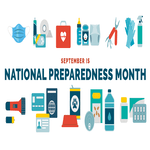
American Founding Father and philosopher Benjamin Franklin is quoted as saying, “by failing to prepare, you are preparing to fail.”
September marks National Preparedness Month, a critical time for communities across our nation to focus on enhancing their readiness for emergencies and disasters.
Sponsored by the Federal Emergency Management Agency, this month emphasizes the importance of taking proactive steps to safeguard ourselves, our families, and our communities against various natural and man-made threats.
The 2024 theme for National Preparedness Month is “Start a Conversation.”
“It may seem like avoiding these topics protects our loved ones from worry and stress, but having an open discussion and getting everyone involved in emergency preparedness can help increase confidence and ability to act when a disaster arises,” said Laurice Bentley, North Central Health District Emergency Preparedness Director.
In addition to promoting open and honest conversations, National Preparedness Month serves as a reminder of the steps we can all take to ensure that we are ready when emergencies strike.
The North Central Health District provides the following preparedness actions that can help to protect yourself, your family, and your community when disasters strike:
1.) Create an Emergency Plan: Develop a comprehensive strategy that includes escape routes, communication plans, and a list of important contacts. Ensure that all family members are familiar with the plan and practice regular drills.
2.) Build an Emergency Kit: Assemble a disaster supply packet with essential items such as non-perishable food, water, medications, a flashlight, batteries, an emergency radio, and a first aid kit. Remember to tailor the set to your specific needs and consider including items for pets and making a separate emergency kit for your car. Remember to periodically review all items and replace anything that has expired.
3.) Stay Informed: Keep up-to-date with local emergency alerts and warnings by signing up for community alert systems, following reliable news sources, and using notification apps about potential risks and responses. You should have multiple sources of information in the event of any disruptions.
4.) Prepare Your Home: Make your house more resilient by securing heavy items, reinforcing windows and doors, and ensuring that smoke detectors and carbon monoxide alarms are properly working.
5.) Engage with Your Community: Participate in local preparedness events and training sessions, such as courses teaching first aid and CPR. Build connections with neighbors and community organizations that can enhance collective preparedness and response efforts.
For additional resources and tips on how to prepare for emergencies, visit NCHD52.org/prepare.



